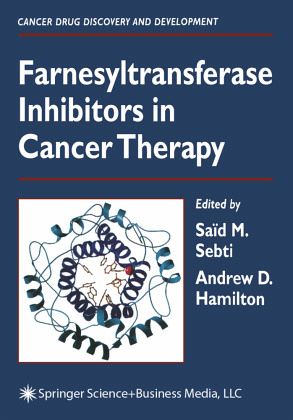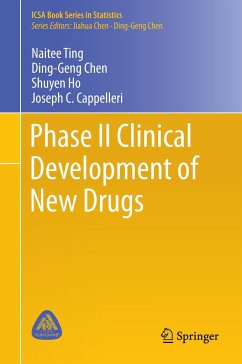
Farnesyltransferase Inhibitors in Cancer Therapy

PAYBACK Punkte
57 °P sammeln!
With the explosion of research on genes capable of causing cancer, it has become clear that mutations in the GTPase, Ras, a major regulator of cell division, are found in about 30% of all human cancers, and that farnesylation, a lipid posttranslational modification of Ras, is required for its cancer-causing activity. In Farnesyltransferase Inhibitors in Cancer Therapy, cutting-edge researchers describe their efforts to design, synthesize, and evaluate the biological activities of farnesyltransferase inhibitors (FTIs) and geranylgeranyltransferase inhibitors (GGTIs) that can be used as anticanc...
With the explosion of research on genes capable of causing cancer, it has become clear that mutations in the GTPase, Ras, a major regulator of cell division, are found in about 30% of all human cancers, and that farnesylation, a lipid posttranslational modification of Ras, is required for its cancer-causing activity. In Farnesyltransferase Inhibitors in Cancer Therapy, cutting-edge researchers describe their efforts to design, synthesize, and evaluate the biological activities of farnesyltransferase inhibitors (FTIs) and geranylgeranyltransferase inhibitors (GGTIs) that can be used as anticancer drugs and in cardiovascular and parasitic therapy. The authors survey in detail such inhibitors as CAAX box peptidomimetics, FPP mimics, and bisubstrate transition state analogs, and critically review their uses in combination with radiation and other cytotoxic agents, such as gemcitabine, cisplatin, and taxanes. The book also discusses the results from several phase I and II human clinical trials using a variety of FTIs, and demonstrates the design of hypothesis-driven clinical trials with proof-of-concept using biochemical endpoints.
Illuminating and richly detailed, Farnesyltransferase Inhibitors in Cancer Therapy constitutes today's standard reference for the pathbreaking use of FTIs and GGTIs in anticancer therapy and offers basic and clinical investigators a comprehensive treatment of the scientific and medical aspects of farnesyltransferase inhibitors.
Illuminating and richly detailed, Farnesyltransferase Inhibitors in Cancer Therapy constitutes today's standard reference for the pathbreaking use of FTIs and GGTIs in anticancer therapy and offers basic and clinical investigators a comprehensive treatment of the scientific and medical aspects of farnesyltransferase inhibitors.














